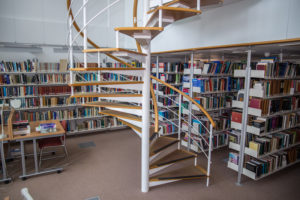 We recognise that mature students often come to university through different and sometimes unconventional routes, rather than applying straight from school while studying for A-Levels. As a mature college, we are well equipped to recognise, assess and accept a range of different qualifications from both the UK and overseas.
We recognise that mature students often come to university through different and sometimes unconventional routes, rather than applying straight from school while studying for A-Levels. As a mature college, we are well equipped to recognise, assess and accept a range of different qualifications from both the UK and overseas.
The nature and demands of Cambridge courses mean they require academic preparation, and mature students are expected to be of an equal academic standard to school leavers, although do not necessarily need to have the same qualifications. We recommend that all applicants who achieved their academic qualifications more than three years prior to application undertake some additional preparation. This is simply so that you can engage with academic studies at the same high level as soon as your degree begins. Applicants who have taken a break from study lasting more than three years are likely to be disadvantaged if they do not prepare formally.
There are some qualifications which are frequently studied by mature learners in the UK that we can provide more details about. Our entry requirements for students holding international qualifications can be found here.
A-Levels
Some mature applicants apply to us with A-Levels, either taken in the UK or internationally. For some courses, especially in the sciences, A-Levels are the best choice of qualifications to take. This is because A-Levels in specific subjects are a requirement for entry to those degrees, and it is difficult to find alternative qualifications that ensure the same level of preparation that will allow students to thrive in Cambridge. Please check any subject requirements listed for your intended course on the University website here.
Access to Higher Education Diplomas
Access to HE Diplomas are typically taken in a single academic year and so candidates are strongly advised to apply during the later March admissions round if possible. Access to HE Diplomas are particularly suited for courses in the arts and humanities at Cambridge, as well as the Psychological and Behavioural Sciences Tripos. The structure of these courses can vary, and you should ensure that the course you follow has a substantial examination element. For an Access to HE Diploma to be considered as a suitable qualification for entry to Cambridge, we would be looking for Distinction grades in each subject unit of the Diploma.
Access to HE Diplomas on their own are not sufficient preparation for our science courses. For those courses, candidates are encouraged to combine an Access to HE Diploma with at least one A-Level.
Certificates of Higher Education/Foundation Years
A Certificate of Higher Education is equivalent to the first year of a UK degree (120 UCAS credits at level 4) and can be excellent preparation for a degree at Cambridge.
These are often awarded at the end of a university Foundation Year (including the Cambridge Foundation Year Programme). They can be studied as a standalone qualification (e.g. with the Open University) or can be awarded as the result of combining credits (e.g. two undergraduate Certificates from the Cambridge Institute of Continuing Education).
Incomplete Undergraduate Degrees
Some students come to us having already studied for one year at another university. Whilst we are happy to consider such requests, do note that we cannot accept the transfer of credits and students will have to start our courses from the beginning of the first year. Please note that applicants who apply whilst still studying at another UK university will not normally be considered. This is only possible in exceptional circumstances, and we will ask for a letter of support from your current course director or tutor to support your application.
Many of our applicants come to us having made subject choices at school or University that they later regret. A ‘false start’ elsewhere will not normally affect your chances of admission, provided you are able to explain it sensibly and supply relevant evidence on request. Please note, however, that applications from students who have failed at or have been excluded from another medical school will not be considered for entry to Medicine at Cambridge.
Open University Courses and Credits
There are a number of different Certificates and Diplomas at various levels that can be taken through the Open University. Their exact equivalency to A-Levels will depend on the combination of Open University courses you are taking. To discuss this, we recommend that you schedule a meeting with the Head of Admissions by emailing admissions@st-edmunds.cam.ac.uk
Portfolios of Qualifications
Many people apply with a mix of different qualifications, which they have taken at different times and with different organisations. These can be great preparation for a Cambridge degree provided that at least some of the courses are recent and relevant. We are always happy to help prospective students answer any questions they might have about their existing (or planned) qualifications. To get in touch with us, please email us at: admissions@st-edmunds.cam.ac.uk.
Vocational and Professional Qualifications
Vocational and professional qualifications can be used to demonstrate commitment to your chosen subject, but do not constitute sufficient academic preparation for study at Cambridge and are not eligible entrance qualifications. Prospective applicants holding these qualifications are advised to contact the Admissions Office for further guidance by emailing us at: admissions@st-edmunds.cam.ac.uk.
 English Language Requirements
English Language Requirements
It is essential that your English language skills are good enough to undertake an intensive and challenging academic course that is both taught and examined in English.
If English is not your first language, we may ask for evidence of language proficiency prior to admission. For some European students, this may consist of a high grade in the English component of your school-leaving qualification. For other candidates from nations not on the UK Government’s list of English-speaking countries, we usually ask you to complete the International English Language Testing System (IELTS) and achieve an overall grade of 7.5 or above (with at least 7.0 in each element). Please note that you do not need to have taken the IELTS when you apply; if you are offered a place, passing the IELTS may be set as a condition of offer.
Admissions Assessments
Admissions Tests
For many subjects, you will need to take an admissions assessment before your interview. For some subjects, you need to register for this assessment in advance and take the test in an approved test centre near you. For other subjects, we will arrange your admissions assessment and contact you with all the relevant details.
You must register in advance for your admissions assessment if you are applying for one of the following subjects:
| Subject | Name of Assessment | Registration Deadline | Test Date | Further Information |
| Chemical Engineering & Biotechnology
Engineering Natural Sciences Veterinary Medicine |
ESAT (Engineering and Science Admissions Test) | 16 September 2024 | 15/16 October 2024 | https://www.undergraduate.study.cam.ac.uk/apply/how/science-engineering-admission-test |
| Computer Science
Economics |
TMUA
(Tests of Mathematics for University Admission |
16 September 2024 | 16/17 October 2024 | https://www.undergraduate.study.cam.ac.uk/apply/how/maths-admission-test |
| Law | LNAT – National Test for Law | 15th September | On or before 16th October | https://lnat.ac.uk/registration/ |
| Medicine | UCAT – University Clinical Aptitude Test | July – September | https://www.undergraduate.study.cam.ac.uk/apply/how/medicine-admission-test |
For the following subjects, the College will arrange an admissions assessment for you if you are shortlisted for interview.
AMES with a European language, Archaeology, Architecture, Classics, Design, English, Geography, History and Modern Languages, History, History and Politics, History of Art, HSPS, Linguistics, Mathematics, Maths with Physics, MML, Music, and Philosophy.
Failure to take any of these tests will result in the automatic rejection of your application, despite what qualifications (academic or professional) that you might already hold.
Written Work
For some courses, you will be asked to provide a sample of your written work. Ideally this work will be from your most recent studies and will be marked. A discussion of your work may then form part of the interview.
Applicants will be asked to submit recent written work in the following subjects. Most subjects require two pieces of written work unless otherwise specified:
- Architecture (we would ask you to present a portfolio of recent work at interview)
- Anglo-Saxon, Norse & Celtic
- Archaeology (only one piece of written work is required, and this should be in essay format)
- Classics
- Design (we would ask you to present a portfolio of recent work at interview)
- Education
- English
- History
- History & Modern Languages (two history essays if applying for an ab initio language, otherwise one history and one foreign language essay)
- History & Politics
- Human, Social & Political Sciences
- Land Economy
- Law
- Linguistics
- MML (one in each language you wish to study – if applying for an ab initio language then please send one foreign language essay and one in English)
- Music
- Psychological and Behavioural Sciences
- Theology Religion & Philosophy of Religion
There is no required word length for written work. Yet, essays between 1,500 and 3,000 words would be most suitable.
We will request a sample of your written work from you when we receive your application; please do not send anything until requested. Essays should be from relevant subjects but can span the range of subjects on which you are working. If you would like to submit two essays from the same subject, it is helpful if they are on separate topics. If your most recent course of study does not include any essay work, then please get in touch with the Admissions Team (admissions@st-edmunds.cam.ac.uk), who will be happy to advise you. Apart from courses with a foreign language element, all submitted written work must be in English. If your writing is in a language other than English, then translations are acceptable.
We will provide further guidance on the requirements for this written work, together with a coversheet, on receipt of your application.
Your marked written work should be sent either as scanned copies via e-mail or by post. If sending hard copies, please note that you should only send us copies of your work as the originals will not be returned to you.
Information about submitted work can be found here.
If you have any queries about written work, please contact the Admissions Office by emailing us at: admissions@st-edmunds.cam.ac.uk.

Interviews
If your application is short-listed, you will be invited for interview. If you apply in October, interviews take place in December. Interviews for those who apply in the second application round are held in April.
All interviews are held online using zoom.
Your interview will take the form of a conversation with one or more subject specialists in your field. Your interviewers will encourage you to think deeply about your subject and consider new ideas and problems. You should see your interview as a chance to experience an example of Cambridge’s Supervision system to find out if this style of teaching will work for you.
Tips on preparing for your interview can be found on the University of Cambridge website.